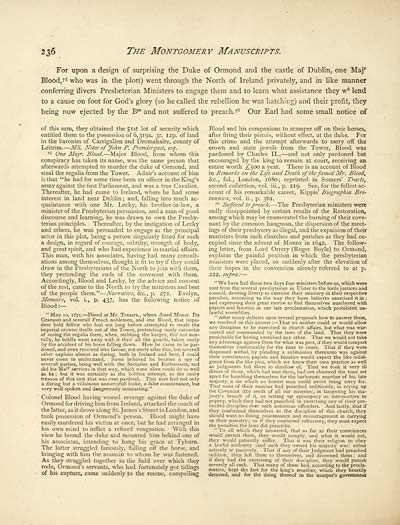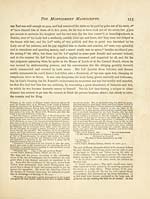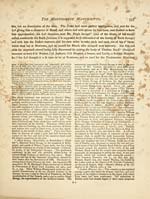Montgomery manuscripts
(250) Page 236
Download files
Complete book:
Individual page:
Thumbnail gallery: Grid view | List view

236
The Montgomery Manuscripts.
For upon a design of surprising the Duke of Ormond and the castle of Dublin, one Maj r
Blood,? 5 who was in the plott) went through the North of Ireland privately, and in like manner
conferring divers Presbeterian Ministers to engage them and to learn what assistance they w a lend
to a cause on foot for God's glory (so he called the rebellion he was hatching) and their profit, they
being now ejected by the B ps and not suffered to preach.? 5 Our Earl had some small notice of
of this sum, they obtained the 51st lot of security which
entitled them to the possession of 6,319a. 3r. I2p. of land
in the baronies of Carrigallen and Dromahaire, county of
Leitrim. — MS. Notes of John P. Prendergast, esq.
73 One Majr. Blood. — Major Blood, from whom this
conspiracy has taken its name, was the same person that
afterwards attempted to murder the duke of Ormond, and
steal the regalia from the Tower. Adair's account of him
is that "he had for some time been an officer in the King's
army against the first Parliament, and was a true Cavalier.
Thereafter, he had come to Ireland, where he had some
interest in land near Dublin ; and, falling into much ac-
quaintance with one Mr. Lecky, his brother-in-law, a
minister of the Presbyterian persuasion, and a man of good
discourse and learning, he was drawn to own the Presby-
terian principles. Thereafter, by the instigation of Lecky
and others, he was persuaded to engage as the principal
actor in this plot, being a person singularly fitted for such
a design, in regard of courage, subtilty, strength of body,
and great spirit, and who had experience in martial affairs.
This man, with his associates, having had many consult-
ations among themselves, thought it fit to try if they could
draw in the Presbyterians of the North to join with them,
they pretending the ends of the covenant with them.
Accordingly, Blood and Lecky, by the advice and consent
of the rest, came to the North to try the ministers and best
of the people there." — Narrative, &c, p. 271. Evelyn,
Memoirs, vol. i., p. 437, has the following notice of
Blood :—
" May 10, 1671. — Dined at Mr. Treasrs., where dined Monsr. De
Gramont and severall French nohlemen, and one Blood, that impu-
dent bold fellow who had not long before attempted to steale the
imperial crowne itselfe out of the Tower, pretending onely curiositie
of seeing the regalia there, when, stabbing the keeper, the" not mor-
tally, he boldly went away with it thro' all the guards, taken onely
by the accident of his horse falling down. How he came to be par-
doned, and even received into favour, not onely after this, but severall
other exploits almost as daring, both in Ireland and here, I could
never come to understand, borne believed he became a spy of
severall parties, being well with the Sectaries and Enthusiasts, and
did his Ma^ services in that way, which none alive could do so well
as he ; but it was certainly as the boldest attempt, so the onely
treason of this sort that was ever pardond. This man had not only
a daring but a villainous unmcrcifull looke, a false countenance, but
very well spoken and dangerously insinuating."
Colonel Blood having vowed revenge against the duke of
Ormond for driving him from Ireland, attacked the coach of
the latter, as it drove along St. James's Street in London, and
took possession of Ormond's person. Blood might have
easily murdered his victim at once, but he had arranged in
his own mind to inflict a refined vengeance. With this
view he bound the duke and mounted him behind one of
his associates, intending to hang his grace at Tyburn.
The latter struggled furiously, falling off the horse, and
bringing with him the assassin to whom he was fastened.
As they struggled together in the field over which they
rode, Ormond's servants, who had fortunately got tidings
of his capture, came suddenly to the rescue, compelling
Blood and his companions to scamper off on their horses,
after firing their pistols, without effect, at the duke. For
this crime and the attempt afterwards to carry off the
crown and state jewels from the Tower, Blood was
pardoned by Charles II., — and not only pardoned but
encouraged by the king to remain at court, receiving an
estate worth jf 500 a year. There is an account of Blood
in Remarks on the Life and Death of the famed Mr. Blood,
&c, fol., London, 1680; reprinted in Somers' Tracts,
second collection, vol. iii., p. 219. See, for the fullest ac-
count of his remarkable career, Kippis' Biographia Bri-
tannica, vol. ii. , p. 361.
76 Suffered to preach. — The Presbyterian ministers were
sadly disappointed by certain results of the Restoration,
among which may be enumerated the burning of their cove-
nant by the common hangman, the dispersion of the meet-
ings of their presbytery as illegal, and the expulsion of their
ministers from such churches and parishes as they had oc-
cupied since the advent of Monro in 1642. The follow-
ing letter, from Lord Orrery (Roger Boyle) to Ormond,
explains the painful position in which the presbyterian
ministers were placed, so suddenly after the elevation of
their hopes in the convention already referred to at p.
222, supra: —
"We have had these two days four ministers before us, which were
sent from the several presbyteries in Ulster to the lords justices and
council, desiring liberty to exercise their ministry in their respective
parishes, according to the way they have hitherto exercised it in ;
and expressing their great sorrow to find themselves numbered with
papists and fanatics in our late proclamation, which prohibited un-
lawful assemblies.
"After many debates upon several proposals how to answer them,
we resolved on this answer : — That we neither could or would allow
any discipline to be exercised in church affairs, but what was war-
ranted and commanded by the laws of the land. That they were
punishable for having exercised any other. That we would not take
any advantage against them for what was past, if they would comport
themselves conformably for the time to come. That if they were
dispensed withal, by pleading a submission thereunto was against
their consciences, papists and fanatics would expect the like indul-
gence from the like plea, which we knew their own practice as well
as judgments led them to disallow of. That we took it very ill
divers of those, which had sent them, had not observed the time set
apart for humbling themselves for the barbarous murther of his late
majesty, a sin which no honest man could avoid being sorry for.
That some of their number had preached seditiously, in crying up
the Covenant (the seeds of all our miseries), in lamenting his ma-
jesty's breach of it, as setting up episcopacy as introductive to
popery, which they had not punished in exercising any of their pre-
tended discipline over such notorious offenders. And lastly, that if
they conformed themselves to the discipline of this church, they
should want no fitting countenance and encouragement in carrying
on their ministry ; so if they continued refractory, they must expect
the penalties the laws did prescribe.
" To all which they answered, that as far as their consciences
would permit them, they would comply, and what it would not,
they would patiently suffer. That it was their religion to obey
a lawful authority (and such they owned his majesty was) either
actively or passively. That if any of their Judgment had preached
sedition, they left them to themselves, and disowned them ; and
if they had the exercising of their discipline, they would punish
severely all such. That many of them had, according to the procla-
mation, kept the fast for the king's murther, which they heartily
detested, and for the doing thereof in the usurper's government
The Montgomery Manuscripts.
For upon a design of surprising the Duke of Ormond and the castle of Dublin, one Maj r
Blood,? 5 who was in the plott) went through the North of Ireland privately, and in like manner
conferring divers Presbeterian Ministers to engage them and to learn what assistance they w a lend
to a cause on foot for God's glory (so he called the rebellion he was hatching) and their profit, they
being now ejected by the B ps and not suffered to preach.? 5 Our Earl had some small notice of
of this sum, they obtained the 51st lot of security which
entitled them to the possession of 6,319a. 3r. I2p. of land
in the baronies of Carrigallen and Dromahaire, county of
Leitrim. — MS. Notes of John P. Prendergast, esq.
73 One Majr. Blood. — Major Blood, from whom this
conspiracy has taken its name, was the same person that
afterwards attempted to murder the duke of Ormond, and
steal the regalia from the Tower. Adair's account of him
is that "he had for some time been an officer in the King's
army against the first Parliament, and was a true Cavalier.
Thereafter, he had come to Ireland, where he had some
interest in land near Dublin ; and, falling into much ac-
quaintance with one Mr. Lecky, his brother-in-law, a
minister of the Presbyterian persuasion, and a man of good
discourse and learning, he was drawn to own the Presby-
terian principles. Thereafter, by the instigation of Lecky
and others, he was persuaded to engage as the principal
actor in this plot, being a person singularly fitted for such
a design, in regard of courage, subtilty, strength of body,
and great spirit, and who had experience in martial affairs.
This man, with his associates, having had many consult-
ations among themselves, thought it fit to try if they could
draw in the Presbyterians of the North to join with them,
they pretending the ends of the covenant with them.
Accordingly, Blood and Lecky, by the advice and consent
of the rest, came to the North to try the ministers and best
of the people there." — Narrative, &c, p. 271. Evelyn,
Memoirs, vol. i., p. 437, has the following notice of
Blood :—
" May 10, 1671. — Dined at Mr. Treasrs., where dined Monsr. De
Gramont and severall French nohlemen, and one Blood, that impu-
dent bold fellow who had not long before attempted to steale the
imperial crowne itselfe out of the Tower, pretending onely curiositie
of seeing the regalia there, when, stabbing the keeper, the" not mor-
tally, he boldly went away with it thro' all the guards, taken onely
by the accident of his horse falling down. How he came to be par-
doned, and even received into favour, not onely after this, but severall
other exploits almost as daring, both in Ireland and here, I could
never come to understand, borne believed he became a spy of
severall parties, being well with the Sectaries and Enthusiasts, and
did his Ma^ services in that way, which none alive could do so well
as he ; but it was certainly as the boldest attempt, so the onely
treason of this sort that was ever pardond. This man had not only
a daring but a villainous unmcrcifull looke, a false countenance, but
very well spoken and dangerously insinuating."
Colonel Blood having vowed revenge against the duke of
Ormond for driving him from Ireland, attacked the coach of
the latter, as it drove along St. James's Street in London, and
took possession of Ormond's person. Blood might have
easily murdered his victim at once, but he had arranged in
his own mind to inflict a refined vengeance. With this
view he bound the duke and mounted him behind one of
his associates, intending to hang his grace at Tyburn.
The latter struggled furiously, falling off the horse, and
bringing with him the assassin to whom he was fastened.
As they struggled together in the field over which they
rode, Ormond's servants, who had fortunately got tidings
of his capture, came suddenly to the rescue, compelling
Blood and his companions to scamper off on their horses,
after firing their pistols, without effect, at the duke. For
this crime and the attempt afterwards to carry off the
crown and state jewels from the Tower, Blood was
pardoned by Charles II., — and not only pardoned but
encouraged by the king to remain at court, receiving an
estate worth jf 500 a year. There is an account of Blood
in Remarks on the Life and Death of the famed Mr. Blood,
&c, fol., London, 1680; reprinted in Somers' Tracts,
second collection, vol. iii., p. 219. See, for the fullest ac-
count of his remarkable career, Kippis' Biographia Bri-
tannica, vol. ii. , p. 361.
76 Suffered to preach. — The Presbyterian ministers were
sadly disappointed by certain results of the Restoration,
among which may be enumerated the burning of their cove-
nant by the common hangman, the dispersion of the meet-
ings of their presbytery as illegal, and the expulsion of their
ministers from such churches and parishes as they had oc-
cupied since the advent of Monro in 1642. The follow-
ing letter, from Lord Orrery (Roger Boyle) to Ormond,
explains the painful position in which the presbyterian
ministers were placed, so suddenly after the elevation of
their hopes in the convention already referred to at p.
222, supra: —
"We have had these two days four ministers before us, which were
sent from the several presbyteries in Ulster to the lords justices and
council, desiring liberty to exercise their ministry in their respective
parishes, according to the way they have hitherto exercised it in ;
and expressing their great sorrow to find themselves numbered with
papists and fanatics in our late proclamation, which prohibited un-
lawful assemblies.
"After many debates upon several proposals how to answer them,
we resolved on this answer : — That we neither could or would allow
any discipline to be exercised in church affairs, but what was war-
ranted and commanded by the laws of the land. That they were
punishable for having exercised any other. That we would not take
any advantage against them for what was past, if they would comport
themselves conformably for the time to come. That if they were
dispensed withal, by pleading a submission thereunto was against
their consciences, papists and fanatics would expect the like indul-
gence from the like plea, which we knew their own practice as well
as judgments led them to disallow of. That we took it very ill
divers of those, which had sent them, had not observed the time set
apart for humbling themselves for the barbarous murther of his late
majesty, a sin which no honest man could avoid being sorry for.
That some of their number had preached seditiously, in crying up
the Covenant (the seeds of all our miseries), in lamenting his ma-
jesty's breach of it, as setting up episcopacy as introductive to
popery, which they had not punished in exercising any of their pre-
tended discipline over such notorious offenders. And lastly, that if
they conformed themselves to the discipline of this church, they
should want no fitting countenance and encouragement in carrying
on their ministry ; so if they continued refractory, they must expect
the penalties the laws did prescribe.
" To all which they answered, that as far as their consciences
would permit them, they would comply, and what it would not,
they would patiently suffer. That it was their religion to obey
a lawful authority (and such they owned his majesty was) either
actively or passively. That if any of their Judgment had preached
sedition, they left them to themselves, and disowned them ; and
if they had the exercising of their discipline, they would punish
severely all such. That many of them had, according to the procla-
mation, kept the fast for the king's murther, which they heartily
detested, and for the doing thereof in the usurper's government
Set display mode to:
![]() Universal Viewer |
Universal Viewer | ![]() Mirador |
Large image | Transcription
Mirador |
Large image | Transcription
Images and transcriptions on this page, including medium image downloads, may be used under the Creative Commons Attribution 4.0 International Licence unless otherwise stated. ![]()
| Histories of Scottish families > Montgomery manuscripts > (250) Page 236 |
|---|
| Permanent URL | https://digital.nls.uk/95235927 |
|---|
| Description | A selection of almost 400 printed items relating to the history of Scottish families, mostly dating from the 19th and early 20th centuries. Includes memoirs, genealogies and clan histories, with a few produced by emigrant families. The earliest family history goes back to AD 916. |
|---|

